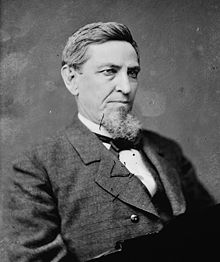Morgan C. Hamilton

This article needs additional citations for verification. (August 2023) |
Morgan Calvin Hamilton | |
|---|---|
 | |
| United States Senator from Texas | |
| In office March 31, 1870 – March 3, 1877 | |
| Preceded by | John Hemphill |
| Succeeded by | Richard Coke |
| Personal details | |
| Born | February 25, 1809 Madison County, Alabama, U.S. |
| Died | November 21, 1893 (aged 84) San Diego, California, U.S. |
| Resting place | Oakwood Cemetery |
| Political party | Republican; Liberal Republican |
| Relations | Andrew Jackson Hamilton (brother) |
Morgan Calvin Hamilton (February 25, 1809 – November 21, 1893) was an American merchant, politician from Alabama and Texas, and brother of Andrew Jackson Hamilton. Both men were unusual as Unionists in Texas during the American Civil War.[1]
Early life and career
[edit]Morgan Calvin Hamilton was born in Madison County, Alabama near Huntsville. His siblings included Andrew Jackson Hamilton.
He moved to Texas when it was still part of Mexico and worked there as a merchant. For six years, from 1839 to 1845, he served in the war department of the Republic of Texas, first as clerk and from 1844 to 1845 as Secretary of War. He settled in Austin.
One of the few Texan abolitionists, Hamilton fought for Union forces during the American Civil War. During Reconstruction, he was elected by the Texas Legislature to the United States Senate as a Radical Republican. While in Congress, Hamilton voted for the Ku Klux Klan Act, but against the Civil Rights Act of 1875.[2][3] He is buried in the Oakwood Cemetery in Austin, Texas.
References
[edit]- ^ "United States Senator Morgan C. Hamilton historical Marker – Williamson County Texas History". williamsoncountytexashistory.org. Retrieved 2023-08-07.
- ^ "TO PASS H.R. 320. -- Senate Vote #50 -- Apr 14, 1871". GovTrack.us. Retrieved 2024-08-08.
- ^ "TO PASS H.R. 796. -- Senate Vote #379 -- Feb 27, 1875". GovTrack.us. Retrieved 2024-08-08.
External links
[edit]

